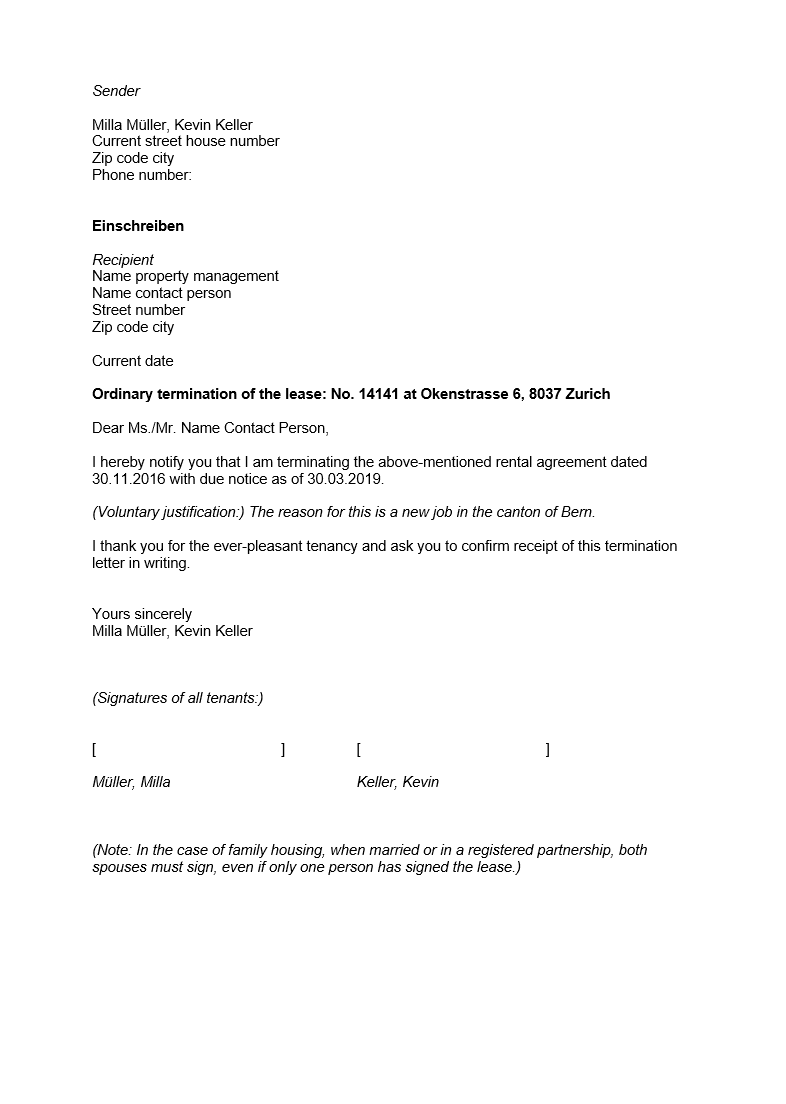
Seamless Farewell: Effective Lease Termination Documentation
Laura February 15, 2024 Article
Navigating the End: A Guide to Effective Lease Termination Documentation
Leaving a rental property marks the end of a chapter, and the importance of proper documentation cannot be overstated. In this guide, we explore the key aspects of lease termination documentation, offering insights and tips to ensure a seamless farewell from your current residence.
Understanding the Essentials: What is Lease Termination Documentation?
Before delving into the details, let’s establish what lease termination documentation entails. It encompasses the formal process of ending your lease agreement and includes various documents that communicate your intention to leave, outline the terms of departure, and address any associated responsibilities.
The Notice Period: Initiating the Termination Process
One of the initial steps in lease termination is providing proper notice to your landlord. The notice period is a crucial aspect that varies by lease agreement and location. Typically, tenants are required to provide notice in writing within a specified timeframe, informing the landlord of their decision to terminate the lease. This initiates the formal termination process.
Crafting a Clear and Concise Notice: Articulating Your Intentions
When composing your lease termination notice, clarity and conciseness are key. Clearly articulate your intention to terminate the lease, specify the date of departure, and provide any relevant details as required by your lease agreement. Crafting a well-written notice sets the tone for a smooth and transparent termination process.
Documenting Property Condition: Preparing for the Final Walkthrough
To mitigate potential disputes over the condition of the property, document its current state before moving out. Conduct a thorough walkthrough, noting any existing damages or issues. Take photographs or videos as visual evidence, and compile a detailed list. This documentation will serve as a reference point during the final walkthrough with your landlord.
Final Walkthrough: Collaborative Inspection of the Property
The final walkthrough is a joint inspection conducted by you and your landlord. During this process, compare the property’s current condition to the documentation you prepared. Address any discrepancies or concerns, and work collaboratively to resolve issues. The final walkthrough is a crucial step in reaching an agreement on the property’s condition.
Returning Keys and Access Devices: Fulfilling Obligations
Part of the lease termination process involves returning all keys and access devices to the landlord. This ensures that you have fulfilled your obligations and no longer have access to the property. Confirm the specific requirements with your landlord and return these items promptly upon vacating the premises.
Handling Security Deposits: Ensuring a Smooth Return
Security deposits are often a significant consideration during lease termination. Understand the terms outlined in your lease agreement regarding the return of the deposit. Address any deductions transparently, providing documentation for repairs or cleaning if required. Timely handling of security deposits contributes to a smooth and amicable termination.
Requesting References: Building a Positive Rental History
As you conclude your lease, consider requesting references from your landlord. A positive reference can be valuable when seeking future rental opportunities. Approach your landlord professionally, highlighting your responsible tenancy and adherence to lease terms.

Understanding Lease Termination Conditions: What You Need to Know
Laura February 6, 2024 Article
Understanding Lease Termination Conditions: What You Need to Know
Leasing a property comes with its own set of rules and responsibilities. One crucial aspect that tenants must be well-versed in is the lease termination conditions. Whether you’re planning to end your lease early or wondering about the circumstances that permit termination, this guide will walk you through the essential aspects of lease termination conditions.
The Basics of Lease Agreements
Before delving into termination conditions, it’s vital to understand the fundamentals of lease agreements. A lease is a legally binding contract between a tenant and a landlord, outlining the terms and conditions of occupancy. Lease agreements typically specify the duration of the lease, rental amount, and any restrictions or obligations for both parties.
Common Lease Termination Conditions
Lease termination conditions can vary, but there are some common factors that might allow a tenant to terminate the lease without penalties. These may include job relocation, health issues, or other unforeseen circumstances. It’s crucial to review your lease agreement thoroughly to identify specific conditions that permit termination without financial repercussions.
Early Lease Termination Fees
In many cases, terminating a lease before the agreed-upon end date incurs financial consequences. Landlords often charge early termination fees, which can be a fixed amount or a percentage of the remaining lease term. Understanding these fees is essential, as they can significantly impact your decision-making process when considering ending your lease prematurely.
Reviewing Your Lease Agreement
To navigate lease termination conditions effectively, thoroughly reviewing your lease agreement is imperative. Look for clauses related to termination, including any notice periods required and specific conditions that allow for termination without penalties. Being well-informed about your contractual obligations will help you make informed decisions.
Communication with Your Landlord
Open communication with your landlord is key when considering lease termination. If you find yourself in a situation where you need to terminate the lease, discuss the matter with your landlord as soon as possible. Some landlords may be willing to negotiate or work out alternative arrangements, especially if the termination is due to valid reasons such as job loss or health issues.
Legal Implications of Lease Termination
Understanding the legal implications of lease termination is crucial. Breaking a lease without adhering to the specified conditions can lead to legal consequences, including financial penalties or even legal action. It’s advisable to seek legal counsel if you’re uncertain about your rights and obligations regarding lease termination.
Documenting Termination Requests
When requesting lease termination, it’s essential to document the process properly. Provide written notice to your landlord, clearly stating the reasons for termination and adhering to any notice periods outlined in the lease agreement. Keeping a record of all communication will help protect your interests in case of disputes.
Seeking Professional Advice
If you’re navigating complex lease termination conditions or facing challenges in your communication with the landlord, seeking professional advice is a wise step. Legal professionals specializing in real estate can provide guidance on your specific situation and help you understand the best course
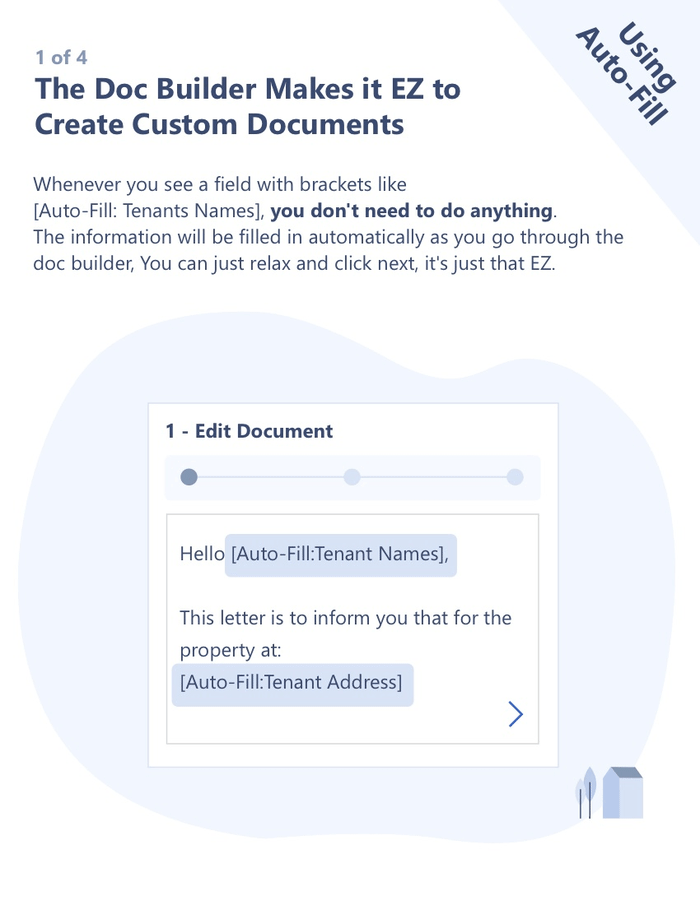
Lease Termination Support: Guiding You Through the Process
Laura February 6, 2024 ArticleLease Termination Support: Guiding You Through the Process
Leaving a rental property can be a complex process, but with the right lease termination assistance, it can be more manageable. In this guide, we’ll explore the various aspects of lease termination and how seeking support can make a significant difference.
Understanding Lease Agreement Terms
The first step in lease termination is a clear understanding of the terms outlined in your lease agreement. Different leases may have varying clauses related to termination, notice periods, and potential penalties. Reading and comprehending these terms sets the groundwork for a smooth termination process.
Navigating Notice Periods and Requirements
Most leases require tenants to provide notice before terminating the lease. The notice period can vary, and failure to adhere to these requirements may result in penalties. Understanding the specific notice periods and requirements in your lease is crucial to avoid complications during the termination process.
Assessing Penalties and Financial Implications
Lease termination may come with financial implications, including penalties or the forfeiture of the security deposit. Understanding the potential financial consequences is essential for tenants. Seeking assistance can help assess these penalties and explore strategies to minimize financial impact during termination.
Seeking Landlord Communication and Approval
Effective communication with your landlord is key when considering lease termination. Seek their approval and discuss your reasons for terminating the lease. Lease termination assistance can guide you on how to approach this conversation, increasing the likelihood of a cooperative and mutually agreed-upon termination.
Exploring Alternatives: Subletting and Assignments
Lease termination assistance often involves exploring alternatives to outright termination. Subletting or lease assignments can be viable options, allowing you to transfer the lease to another tenant. Understanding the legalities and procedures involved in these alternatives is crucial for a successful arrangement.
Legal Consultation for Complex Cases
In some instances, lease termination can become legally complex, especially if there are disputes or disagreements. Seeking legal consultation provides valuable insights into your rights, the landlord’s obligations, and potential legal repercussions. Lease termination assistance that includes legal guidance ensures you navigate the process with confidence.
Documenting Termination Agreements
Once the terms of termination are agreed upon, it’s essential to document them in writing. Clear documentation protects both parties and minimizes the risk of misunderstandings or disputes in the future. Lease termination assistance can provide guidance on creating a comprehensive and legally sound termination agreement.
Physical Move-Out Preparation
Leaving a rental property involves physical preparation, including cleaning, repairs, and ensuring that the property is returned in good condition. Lease termination assistance can offer checklists and guidance on the steps involved in preparing for a smooth move-out process.
Transferring Utilities and Informing Services
As part of the termination process, tenants need to transfer utilities and inform relevant services about the impending move. Assistance in organizing these tasks ensures a seamless transition and prevents any post-move complications.
Post-Move Follow-Up and Support
Even after the move, lease termination assistance can provide support in case of any post-move issues or questions. Whether it’s related to final bills, security
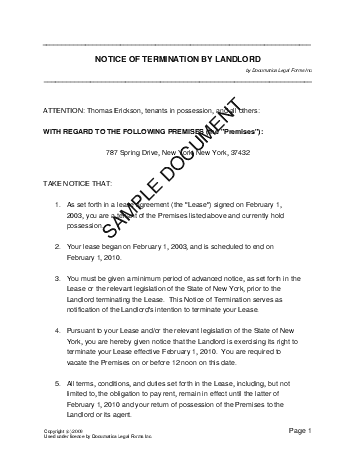
Navigating Lease Termination: Conditions and Considerations
Laura February 6, 2024 Article
Decoding Lease Termination: Navigating Conditions and Considerations
Lease termination is a significant aspect of the rental journey, demanding a comprehensive understanding of conditions and considerations. From the legal intricacies to practical aspects, this article guides you through the process, shedding light on key elements that shape lease termination.
Understanding Lease Terms: The Foundation of Termination Conditions
Before delving into the termination process, a solid understanding of your lease terms is essential. Lease agreements typically outline conditions under which termination can occur, whether due to expiration, breach of terms, or mutual agreement. Familiarizing yourself with these terms sets the stage for a smooth termination process.
Legal Framework: Navigating the Juridical Landscape
Lease termination involves legal considerations that vary based on jurisdiction and the specifics of your lease agreement. It’s crucial to be aware of local landlord-tenant laws, as they dictate the permissible reasons and procedures for lease termination. Seeking legal advice or consulting relevant resources can provide clarity on the legal framework.
Reasons for Termination: Unraveling Permissible Grounds
Leases often specify permissible grounds for termination, ranging from non-payment of rent to violations of lease terms. Understanding these reasons is pivotal, as they influence the legitimacy of your decision to terminate. Some leases also allow termination without cause, provided proper notice is given.
Providing Notice: The Etiquette of Termination
Regardless of the reason, providing notice is a fundamental aspect of lease termination. Lease agreements typically outline the required notice period, which can vary. Respectfully communicating your intention to terminate the lease, adhering to the specified notice period, reflects a commitment to ethical and transparent dealings.
Financial Implications: Unraveling Fees and Responsibilities
Lease termination can carry financial implications. Familiarize yourself with any penalties or fees outlined in your lease agreement for early termination. Additionally, tenants are often responsible for rent until the end of the notice period or until a new tenant takes occupancy, adding a financial aspect to the termination process.
Property Condition: Meeting Expectations for a Smooth Transition
Lease agreements commonly include provisions regarding the condition in which the property should be returned. Meeting these expectations is crucial for a smooth transition. Conducting a thorough inspection and addressing any necessary repairs or cleaning ensures compliance with the agreed-upon conditions.
Security Deposits: The Role in Lease Termination
The return of the security deposit is a significant aspect of lease termination. Lease agreements typically outline conditions under which deductions can be made. Addressing any property damage or outstanding rent payments promptly can facilitate the return of the security deposit in accordance with the lease terms.
Mutual Agreement: Exploring Amicable Termination
In some cases, lease termination occurs through mutual agreement between the landlord and tenant. This could be due to changes in circumstances, such as job relocation or personal reasons. Negotiating mutually agreeable terms and documenting them in writing ensures a smooth and amicable termination process.
Seeking Professional Guidance: Assistance in Complex Cases
Lease termination can be complex, especially in unique or challenging situations. Seeking professional guidance, such as legal advice or consulting property
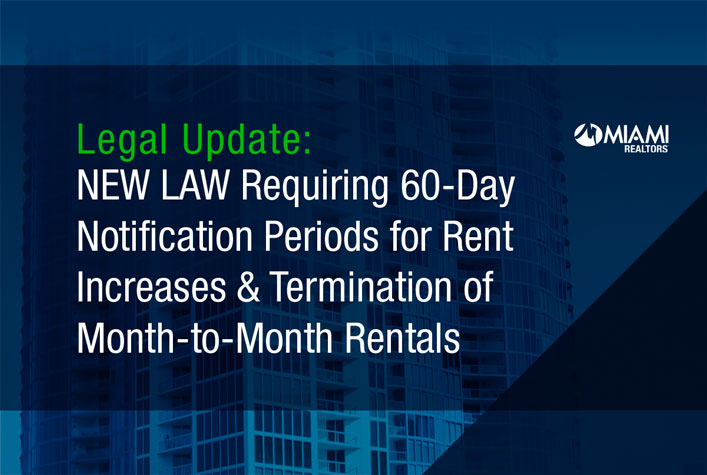
Navigating Lease Termination: Expert Assistance for Smooth Exits
Laura January 30, 2024 Article
Guiding You Through: Expert Assistance in Lease Termination
Lease termination can be a complex process, filled with considerations and potential pitfalls. Seeking expert assistance during this phase can make a significant difference in ensuring a smooth exit from your rental agreement. In this article, we explore the invaluable assistance available for navigating the intricacies of lease termination.
Understanding the Complexity: The Need for Expert Guidance
Lease termination involves more than simply handing over your keys. It requires a comprehensive understanding of the legalities, financial implications, and potential challenges that may arise. Expert assistance becomes crucial in helping tenants navigate this complexity, ensuring that every aspect of the termination process is handled with care and precision.
Legal Insights: Navigating the Legal Landscape
One of the primary benefits of seeking lease termination assistance is gaining access to legal insights. Legal professionals specializing in real estate can provide guidance on tenant rights, obligations, and the specific clauses outlined in the lease agreement. This ensures that tenants are well-informed about the legal landscape surrounding their lease termination.
Financial Considerations: Minimizing Unforeseen Costs
Leaving a rental property involves various financial considerations, from potential penalties for breaking the lease early to understanding the return of the security deposit. Expert assistance helps tenants navigate these financial aspects, providing insights into potential costs and strategies to minimize unforeseen expenses during the lease termination process.
Negotiation Strategies: Achieving Favorable Terms
Expert assistance becomes particularly valuable when negotiating the terms of lease termination. Whether it’s negotiating a reduced notice period, discussing early termination fees, or finding common ground with the landlord, professionals experienced in lease agreements can employ effective negotiation strategies to achieve more favorable terms for tenants.
Documentation and Paperwork: Ensuring Accuracy
Lease termination involves a significant amount of documentation and paperwork. From the formal notice of termination to documenting the condition of the property upon departure, accuracy is paramount. Expert assistance ensures that all necessary paperwork is handled meticulously, reducing the risk of disputes and facilitating a smoother transition out of the rental property.
Communication with Landlords: Facilitating Open Dialogue
Expert assistance extends to facilitating open and constructive communication with landlords. Professionals in this field can guide tenants on the best ways to communicate their intention to terminate the lease, address any concerns, and ensure that the process is transparent and respectful. Effective communication helps in building positive relationships with landlords.
Navigating Special Circumstances: Tailored Solutions
Lease termination can become more complex in specific circumstances, such as job relocations, health issues, or changes in family dynamics. Expert assistance provides tenants with tailored solutions to navigate these special circumstances, ensuring that their unique needs are considered and addressed throughout the termination process.
Guidance on Property Condition: Meeting Expectations
Leaving a rental property in good condition is often a requirement outlined in lease agreements. Expert assistance includes guidance on meeting the expectations regarding property condition. This may involve recommendations for cleaning services, repairs, or other steps to ensure that the property is returned in the condition specified in the lease.
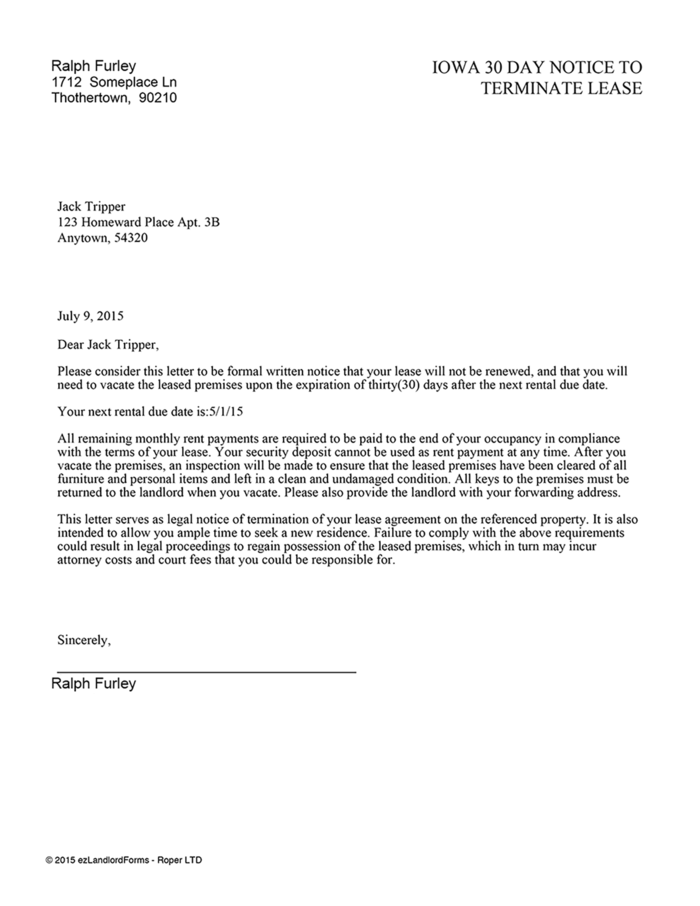
Navigating Lease Termination: Essential Requirements Unveiled
Laura January 30, 2024 ArticleNavigating Lease Termination: Essential Requirements Unveiled
Terminating a lease can be a complex process, requiring careful attention to specific requirements to ensure a smooth and lawful exit. In this comprehensive guide, we will explore the essential requirements for lease termination, empowering you with the knowledge needed to navigate this critical aspect of renting.
Understanding Lease Terms and Termination Clauses
Before initiating the lease termination process, it’s crucial to thoroughly understand the terms outlined in your lease agreement. Pay special attention to any clauses related to lease termination. These clauses often specify the notice period required, potential penalties, and other conditions that must be met for a lawful termination.
Notifying Your Landlord in Advance
One of the primary requirements for lease termination is providing advance notice to your landlord. The notice period is typically outlined in your lease agreement and can vary from 30 to 60 days. Adhering to this timeline is essential for maintaining a positive relationship with your landlord and avoiding potential legal issues.
Documenting the Notice in Writing
To ensure clarity and avoid disputes, it’s advisable to document the lease termination notice in writing. A written notice should include the date, your intention to terminate the lease, and any additional information required by your specific lease agreement. Keeping a copy of this notice for your records is crucial for reference and potential legal proceedings.
Addressing Financial Obligations
Lease termination often involves financial considerations, such as fulfilling the remaining rent for the notice period or potential penalties for early termination. Review your lease agreement to understand the financial obligations associated with termination. Clear communication with your landlord about settling these financial matters is essential to prevent misunderstandings.
Conducting a Move-Out Inspection
Many leases require tenants to allow a move-out inspection before the termination is complete. This inspection assesses the condition of the property and identifies any damages that may impact the return of your security deposit. Cooperating with your landlord during this inspection is a key requirement for a successful lease termination.
Returning Keys and Possession of the Property
Another critical requirement for lease termination is the timely return of keys and possession of the property. Ensure that all keys are returned to the landlord, and the property is left in the condition specified in your lease agreement. Failure to meet this requirement may result in additional charges or legal consequences.
Communicating Forwarding Address for Security Deposit
To facilitate the return of your security deposit, provide your landlord with a forwarding address where they can send the deposit. Some jurisdictions have specific regulations regarding the timeline for returning the deposit. Being proactive in communicating your new address ensures a smooth process and minimizes delays.
Understanding Legal Ramifications
Lease termination requirements often have legal implications, and understanding them is crucial to avoid potential legal consequences. Consult local tenancy laws to ensure that you are complying with all legal requirements for lease termination. Seeking legal advice, if necessary, can provide additional clarity and guidance.
Utilizing Online Resources for Lease Termination
For
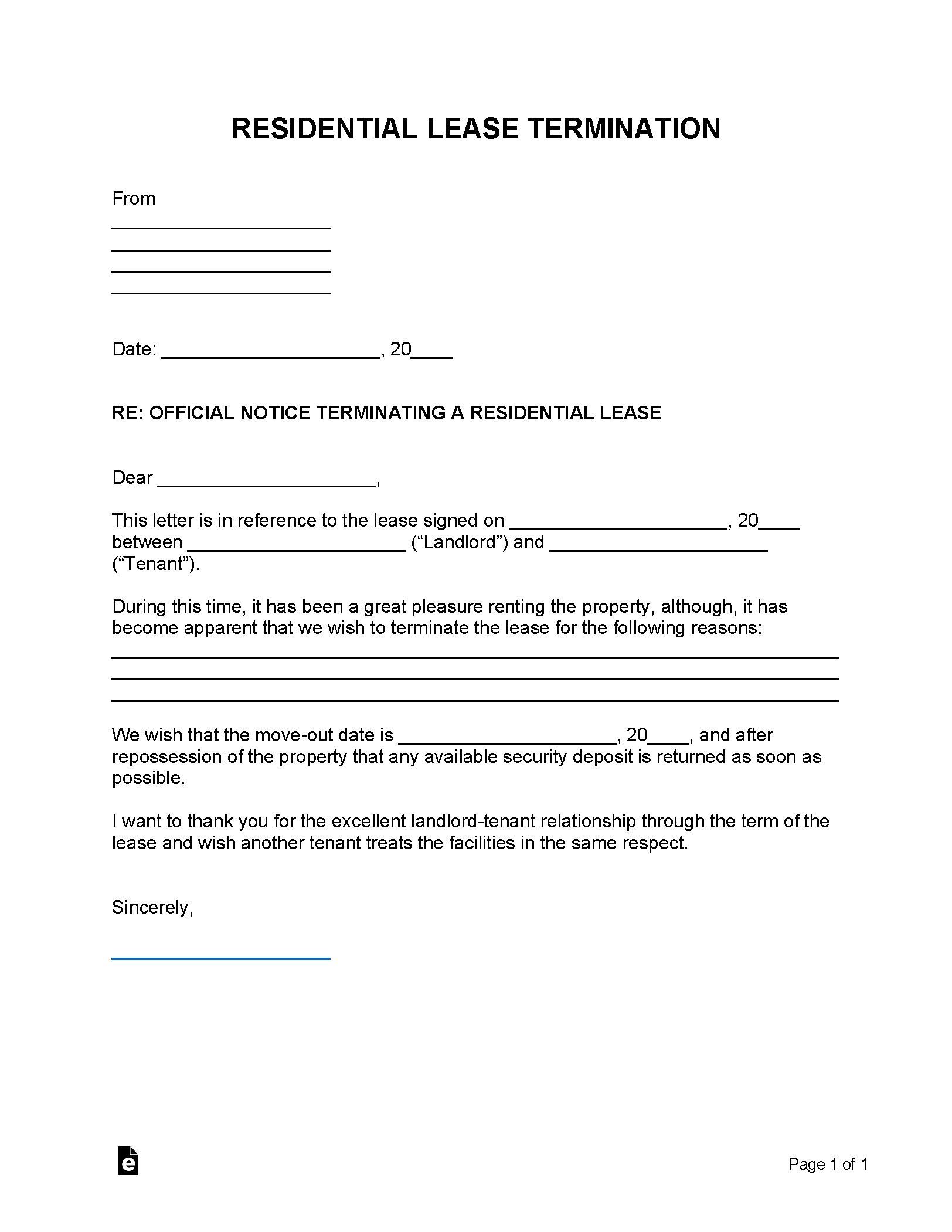

Lease termination is a crucial process for both landlords and tenants, and having a well-documented procedure in place is essential. In this article, we will explore the importance of streamlined termination documentation and how it can benefit all parties involved.
Simplifying the Termination Process
One of the primary reasons for emphasizing a streamlined lease termination process is to simplify the overall experience for both landlords and tenants. Clear and concise documentation helps in avoiding confusion and misunderstandings, making the process more efficient.
Legal Compliance and Protection
Proper documentation ensures that the termination process adheres to legal requirements and regulations. This not only protects the rights of both parties but also provides a solid legal foundation in case of any disputes that may arise during or after the termination.
Clarity in Expectations
Having a detailed lease termination document helps set clear expectations for both landlords and tenants. It outlines the responsibilities and obligations of each party, reducing the likelihood of disagreements and ensuring a smoother transition out of the leased property.
Importance of Timely Documentation
Timeliness is crucial in the lease termination process. Delays can lead to additional expenses and complications. Streamlined documentation facilitates a faster and more efficient termination process, allowing both parties to move forward without unnecessary delays.
Addressing Specific Termination Terms
Lease agreements often include specific terms related to termination. These could involve notice periods, condition requirements, or other stipulations. Proper documentation ensures that all these terms are explicitly addressed, preventing any potential issues down the line.
Providing a Resource for Future Reference
Well-documented lease terminations serve as a valuable resource for future reference. Whether it’s for the landlord, tenant, or any legal authorities involved, having a comprehensive record of the termination process can prove invaluable in case of inquiries or audits.
The Role of Technology in Streamlining Documentation
In the digital age, technology plays a significant role in streamlining documentation processes. Online platforms and tools can help automate the creation and storage of termination documents, making the entire process more efficient and reducing the likelihood of errors.
Implementing Best Practices
To ensure the effectiveness of lease termination documentation, it’s essential to implement best practices. This includes using standardized templates, obtaining signatures from all involved parties, and securely storing the documents for future reference.
Conclusion
In conclusion, a well-documented lease termination process is essential for a smooth and efficient transition for both landlords and tenants. From simplifying the process and ensuring legal compliance to providing a valuable resource for future reference, the benefits of streamlined documentation are numerous. For more information on lease termination documentation, you can refer to First Business Service.
By following best practices and utilizing technology, landlords and tenants can make the termination process a collaborative and transparent experience, fostering positive landlord-tenant relationships even in the face of lease conclusion.

Navigating Lease Termination Consequences: What to Expect
Laura January 28, 2024 Article
Navigating Lease Termination Consequences: What to Expect
Lease termination is a significant decision that can have consequences for both landlords and tenants. Understanding the potential outcomes and preparing for the process can help mitigate challenges and foster a smoother transition.
Reviewing Lease Agreement Terms
Before initiating the lease termination process, it’s crucial to revisit and thoroughly review the terms outlined in the lease agreement. Familiarize yourself with any clauses related to termination, notice periods, and potential consequences. This foundational understanding will guide you through the process and help set realistic expectations.
Financial Implications for Tenants
One of the primary consequences tenants may face upon lease termination is financial in nature. Landlords often include early termination fees or penalties in lease agreements to compensate for potential financial losses. It’s essential for tenants to be aware of these fees and plan accordingly, as they can impact the overall cost of moving out before the lease term concludes.
Impact on Rental History and Credit
Lease termination can have implications beyond the immediate financial consequences. It may affect your rental history and credit score. Landlords commonly report lease terminations to credit bureaus, potentially impacting your ability to secure future rental agreements or obtain favorable credit terms. Being aware of this potential consequence underscores the importance of fulfilling lease obligations or negotiating terms with your landlord.
Legal Ramifications and Disputes
Lease terminations can sometimes lead to legal ramifications and disputes between tenants and landlords. If the termination process is not handled according to the terms outlined in the lease agreement or local rental laws, it may result in legal actions. Seeking legal advice or mediation can be beneficial if disagreements arise during the termination process.
Security Deposit Handling
Tenants should pay close attention to the handling of the security deposit upon lease termination. Landlords typically use the security deposit to cover unpaid rent, damages beyond normal wear and tear, or cleaning costs. Understanding the landlord’s expectations and fulfilling any necessary responsibilities can help ensure a smooth return of the security deposit.
Communication with the Landlord
Open and transparent communication with the landlord is crucial during the lease termination process. Informing the landlord of your decision well in advance and discussing the circumstances can sometimes lead to more amicable resolutions. Some landlords may be willing to negotiate terms or provide flexibility, especially if the termination is due to unforeseen circumstances.
Tenant Responsibilities for Property Restoration
Lease agreements often outline specific responsibilities for tenants concerning property restoration upon termination. This may include tasks such as thorough cleaning, repairing damages, or returning the property to its original condition. Failure to fulfill these responsibilities may result in additional charges and could impact the return of the security deposit.
Strategic Timing of Termination
The timing of lease termination can influence its consequences. Providing ample notice to the landlord and terminating the lease during a mutually agreeable time can positively impact the overall process. Consideration for the landlord’s circumstances and adherence to lease terms regarding notice periods can contribute to a
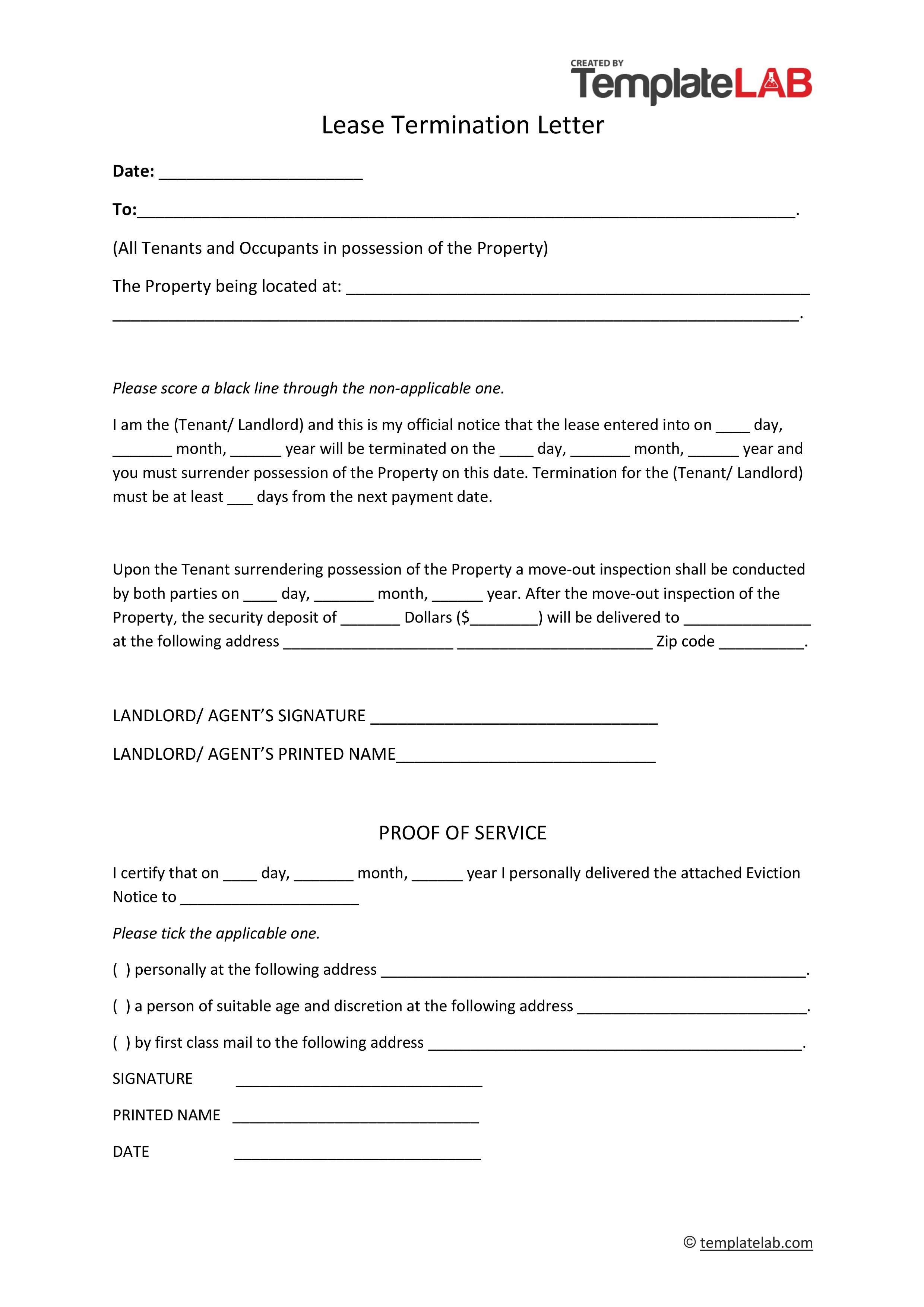
Navigating Lease Termination: Essential Conditions for a Smooth Exit
Laura January 19, 2024 Article
Navigating Lease Termination: Essential Conditions for a Smooth Exit
Leaving a rental property involves more than just packing up; it requires a clear understanding of lease termination conditions to ensure a smooth transition for both tenants and landlords. In this guide, we’ll explore the key considerations and steps involved in navigating lease termination conditions.
Understanding Lease Terms and Conditions
The journey to a successful lease termination begins with a thorough understanding of the terms and conditions outlined in your lease agreement. These conditions typically include details about notice periods, penalties for early termination, and the overall process involved in concluding the lease. Familiarizing yourself with these details is essential for a hassle-free exit.
Initiating Early Communication with the Landlord
Effective communication is crucial when considering lease termination. Rather than waiting until the last minute, initiate a conversation with your landlord well in advance. This communication allows both parties to discuss the reasons for termination, potential alternatives, and any specific conditions that need to be met.
Providing Written Notice of Termination
Once the decision to terminate the lease is made, it’s important to provide written notice to your landlord. This notice should include the date of termination, the reason for leaving, and any other relevant details. Complying with the notice period specified in your lease agreement is crucial to avoid any potential complications.
Assessing Financial Obligations
Lease termination often involves financial considerations, such as fulfilling the remaining rent for the notice period or facing penalties for early termination. Carefully review your lease agreement to understand the financial obligations associated with termination. Open communication with your landlord can help address any concerns or negotiate a mutually agreeable solution.
Conducting a Move-Out Inspection
Many leases require a move-out inspection as part of the termination process. This inspection allows the landlord to assess the condition of the property and identify any damages that may affect the return of your security deposit. Cooperating with this inspection is a key condition for a successful lease termination.
Returning Keys and Possession of the Property
A crucial condition for lease termination is the timely return of keys and possession of the property. Ensure that all keys are returned to the landlord, and the property is left in the condition specified in your lease agreement. Failure to meet this condition may result in additional charges or legal consequences.
Providing a Forwarding Address for Deposits
To facilitate the return of your security deposit, provide your landlord with a forwarding address where they can send the deposit. Some jurisdictions have specific regulations regarding the timeline for returning the deposit. Being proactive in communicating your new address ensures a smooth process and minimizes delays.
Understanding Legal Implications
Lease termination conditions often have legal implications, and understanding them is crucial to avoid potential legal consequences. Consult local tenancy laws to ensure that you are complying with all legal requirements for lease termination. Seeking legal advice, if necessary, can provide additional clarity and guidance.
Documenting Agreements in Writing
Once lease termination conditions are agreed
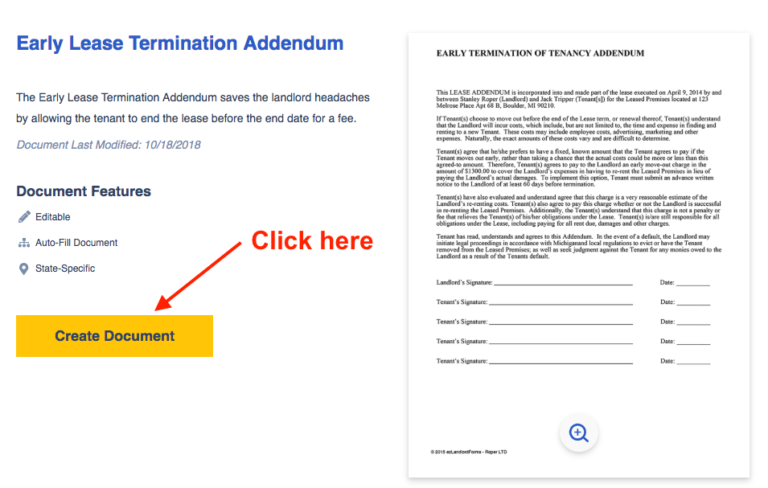

Navigating Goodbyes: Understanding Lease Termination Penalties
Introduction: The Financial Landscape of Lease Termination
Lease termination penalties, often overlooked until the end of a lease term, play a significant role in the financial landscape for both landlords and tenants. In this exploration, we delve into the nuances of lease termination penalties, understanding their implications and how they shape the process of saying farewell to a rented property.
Penalties Overview: Unraveling the Financial Consequences
Lease termination penalties encompass a range of financial consequences that tenants may face when ending a lease agreement prematurely. These penalties can include a variety of charges, such as early termination fees, remaining rent obligations, and potential charges for property damages. Understanding the specific terms outlined in the lease agreement is crucial for tenants to navigate the process smoothly.
Early Termination Fees: The Cost of Saying Goodbye
One common component of lease termination penalties is the imposition of early termination fees. These fees are typically outlined in the lease agreement and serve as compensation to the landlord for the financial inconvenience caused by the premature departure of the tenant. Early termination fees are often calculated based on a predetermined formula specified in the lease.
Remaining Rent Obligations: Fulfilling the Lease Term
Tenants initiating lease termination may find themselves responsible for remaining rent obligations until the end of the agreed-upon lease term. Landlords expect to receive the full rental amount specified in the lease, even if the tenant chooses to vacate the property before the lease’s natural expiration. This aspect emphasizes the importance of carefully considering the lease duration before signing.
Property Damages: Assessing Financial Responsibilities
Lease termination penalties may extend beyond rent-related charges to include costs associated with property damages. Tenants are typically held accountable for damages that go beyond normal wear and tear. Conducting a thorough walkthrough with the landlord and addressing any potential damages before initiating lease termination can help minimize financial surprises.
Negotiating Terms: Seeking Common Ground
While lease termination penalties are often non-negotiable once outlined in the lease agreement, tenants facing unforeseen circumstances may find it worthwhile to initiate a conversation with their landlords. Open and honest communication can sometimes lead to negotiations that result in a more amicable resolution. Landlords may be willing to consider alternative arrangements based on the circumstances.
Understanding Legal Ramifications: Seeking Professional Advice
Lease termination penalties are subject to local and state laws, and understanding the legal implications is crucial for both landlords and tenants. Seeking legal advice or consulting with a real estate professional can provide clarity on the applicable regulations, ensuring that the process is conducted within the bounds of the law.
Mitigating Financial Impact: Planning for Transitions
To minimize the financial impact of lease termination penalties, tenants are encouraged to plan for potential transitions in advance. This includes understanding the terms of the lease agreement, exploring possible scenarios that may lead to early termination, and considering alternatives such as subleasing or lease transfer arrangements.
Conclusion: Navigating Goodbyes with Financial Awareness
Lease termination penalties add a layer
- Total visitors : 3,055
- Total page views: 3,333
Categories
Recent Posts
- Ransomware Recovery: Navigating the Path to Restoration
- Handyman Furnace Repair
- Kelly Wearstler Lighting
- How to find best housekeeping companies in dubai
- Embracing Modern Home Decor
- Why are welding workshops and welding inspections crucial?
- Comprehensive Overview of Data Recovery Services
- Rumah Pintar untuk Masa Depan
- Tips Membeli Rumah untuk Calon Pembeli
- Choosing the Right Location
- The Ultimate Home Bar Setup
- Unveiling Your Dream Home: A Guide to Buying Property in Abu Dhabi
- Transform Your Garden DIY Pond Waterfall Inspirations
- Personalized Outdoor Spaces DIY Seating Inspirations
- Blooming Beauties Creative Flower Beds Around House
- Farmhouse Kitchen Design Rustic Charm for Modern Living
- French Chic Living Room Décor Ideas for Elegant Interiors
- Transforming Spaces Complete Home Renovation Guide
- Budget-Friendly Garden Beautification Dollar Tree Finds
- Whimsical Wonderland Adorable Bedroom Decor for Dreamers
- Transform Your Outdoor Oasis with DIY Patio Projects
- Budgeting Basics Complete Renovation Cost Breakdown
- Inviting Front Garden Ideas for Welcoming Home Entrances
- Skilled Fixer Upper Contractors Transform Your Space Today
- Elegant Dining Formal Dining Room Decor Inspiration
- Transform Your Family Room into a Relaxation Haven
- Personalize Your Walkway Creative DIY Stepping Stones
- Rustic Charm Country Home Decor Ideas & Inspiration
- Elegance Defined Formal Living Room Ideas for Your Home
- Transform Your Outdoor Space DIY Backyard Landscaping Ideas
Archives
- October 2024
- September 2024
- August 2024
- July 2024
- June 2024
- May 2024
- April 2024
- March 2024
- February 2024
- January 2024
- December 2023
- November 2023
- October 2023
- September 2023
- August 2023
- July 2023
- June 2023
- May 2023
- April 2023
- March 2023
- February 2023
- January 2023
- December 2022
- November 2022
- October 2022
- September 2022
- August 2022
- July 2022
- June 2022
- May 2022
- March 2022
- February 2022
- January 2022
- December 2021
- November 2021
- October 2021
- September 2021
- August 2021
- July 2021
- June 2021
- May 2021
- April 2021
- March 2021
- February 2021
- January 2021
- December 2020
- October 2020
- September 2020
- August 2020
- July 2020
- June 2020
- May 2020
- April 2020
- March 2020
- February 2020
- January 2020
- December 2019
- November 2019
- October 2019
- September 2019
- August 2019
- July 2019
- June 2019
- May 2019
- April 2019
- March 2019
- February 2019
- January 2019
- December 2018
- November 2018
- October 2018
- September 2018
- August 2018
- July 2018
- June 2018
- May 2018
- April 2018
- March 2018
- February 2018
- January 2018
- December 2017
- November 2017
- October 2017
- September 2017
- August 2017
- July 2017
- June 2017
- May 2017
- April 2017
- March 2017
- February 2017
- January 2017
- December 2016
- November 2016
- October 2016
Partner
ecommerce web design dubai
ecommerce website development dubai
ecommerce website dubai
ecommerce development in dubai
ecommerce development company dubai
ecommerce development company in dubai
ecommerce development dubai
ecommerce website development companies in dubai
ecommerce website development company in dubai
ecommerce website development in dubai
ecommerce website design company near me
ecommerce website design company dubai
ecommerce web development dubai
web ecommerce development
ecommerce website in uae
ecommerce website design dubai
ecommerce web design agency
Partner
app design Dubai
app developers in dubai
app development companies in dubai
app development dubai
application development dubai
app developers uae
app development companies in uae
app development uae
mobile App designer Dubai
mobile App Development Company Dubai
mobile app development company in dubai
mobile app development dubai
mobile application dubai
mobile app development company in uae
mobile app development uae
mobile application development uae
mobile app development company
